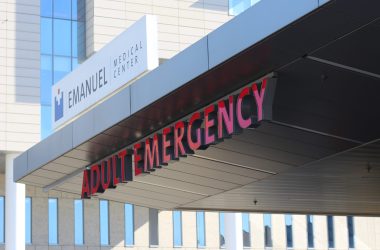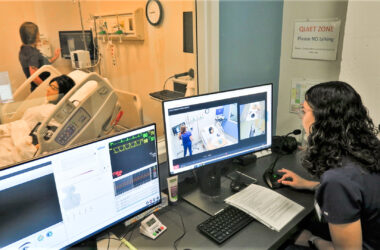After a “terrifying” season of respiratory illness for kids and babies last year, Dr. Jill Pearson says she’s hopeful for a better winter thanks to two new preventative medications available for RSV.
Pearson, the medical director for pediatric hospitalists at Salem Health, said the hospital is now offering RSV monoclonal antibodies to all babies born at the hospital.
“If we have a way to protect babies given right after delivery before they even leave the hospital, this is going to be monumental in terms of the reduction in hospital stays and severe infections in babies,” Pearson said.
The drug, called Beyfortus, is a new injection treatment approved by the U.S. Food and Drug Administration over the summer which gives babies who are most vulnerable to severe cases of illness protective antibodies that help their bodies fight RSV infection. It’s different from a vaccine, which stimulates the body’s immune system to make its own antibodies.
RSV, or respiratory syncytial virus, is a common viral infection which is typically mild but can cause severe illness and death in babies and young children, who can develop respiratory infections that impact their ability to breathe.
It’s the leading cause of hospitalization for babies in the U.S., according to the Centers for Disease Control and Prevention.
Pearson said babies are vulnerable because their airways are much smaller than adults, making it easier for them to become clogged with mucus. Babies also must breathe through their noses while eating since they get food from sucking at a breast or bottle.
In trials, just 1.2% of babies given the monoclonal antibody later required medical care for RSV, compared with 5.4% of babies who were given a placebo, according to clinical trial data published in the New England Journal of Medicine. The study found the drug was 79% effective in preventing illness requiring medical care.
A new vaccine for pregnant women approved in August offers similar protection when received between weeks 32 and 36 of pregnancy. The vaccine triggers an immune response in the woman, allowing her to pass antibodies to the virus to her baby.
“I don’t think I’ve seen anything so impressive in terms of new medications that will impact the care of babies or the need for hospitalization,” Pearson said.
But the cost of the drug, $495 per injection, and high demand have made the drug scarce in some places.
Salem Health participates in the Vaccines for Children program, a federal program which provides vaccines upfront at no cost to providers to administer to children insured through Medicaid, those without insurance, and American Indian or Alaska Native children.
Pearson said a team at the hospital including neonatologists, pharmacists and nurse practitioners worked to make sure the drug was available.
It’s included in the package families pay the hospital for a delivery, so adding it doesn’t result in families paying more to deliver at Salem Health.
“It’s been a very smooth rollout from a very passionate group of people,” she said.
About 3,200 babies are born annually at Salem Health. Since they began offering the antibodies last week, 62 babies have received them.
Pearson said families generally opt in, even those who may be hesitant about vaccines, because it’s an antibody treatment.
“There’s a lot of passion behind parents wanting to protect their kids,” she said.
Contact reporter Rachel Alexander: [email protected] or 503-575-1241.
SUPPORT OUR WORK – We depend on subscribers for resources to report on Salem with care and depth, fairness and accuracy. Subscribe today to get our daily newsletters and more. Click I want to subscribe!

Rachel Alexander is Salem Reporter’s managing editor. She joined Salem Reporter when it was founded in 2018 and covers city news, education, nonprofits and a little bit of everything else. She’s been a journalist in Oregon and Washington for a decade. Outside of work, she’s a skater and board member with Salem’s Cherry City Roller Derby and can often be found with her nose buried in a book.









